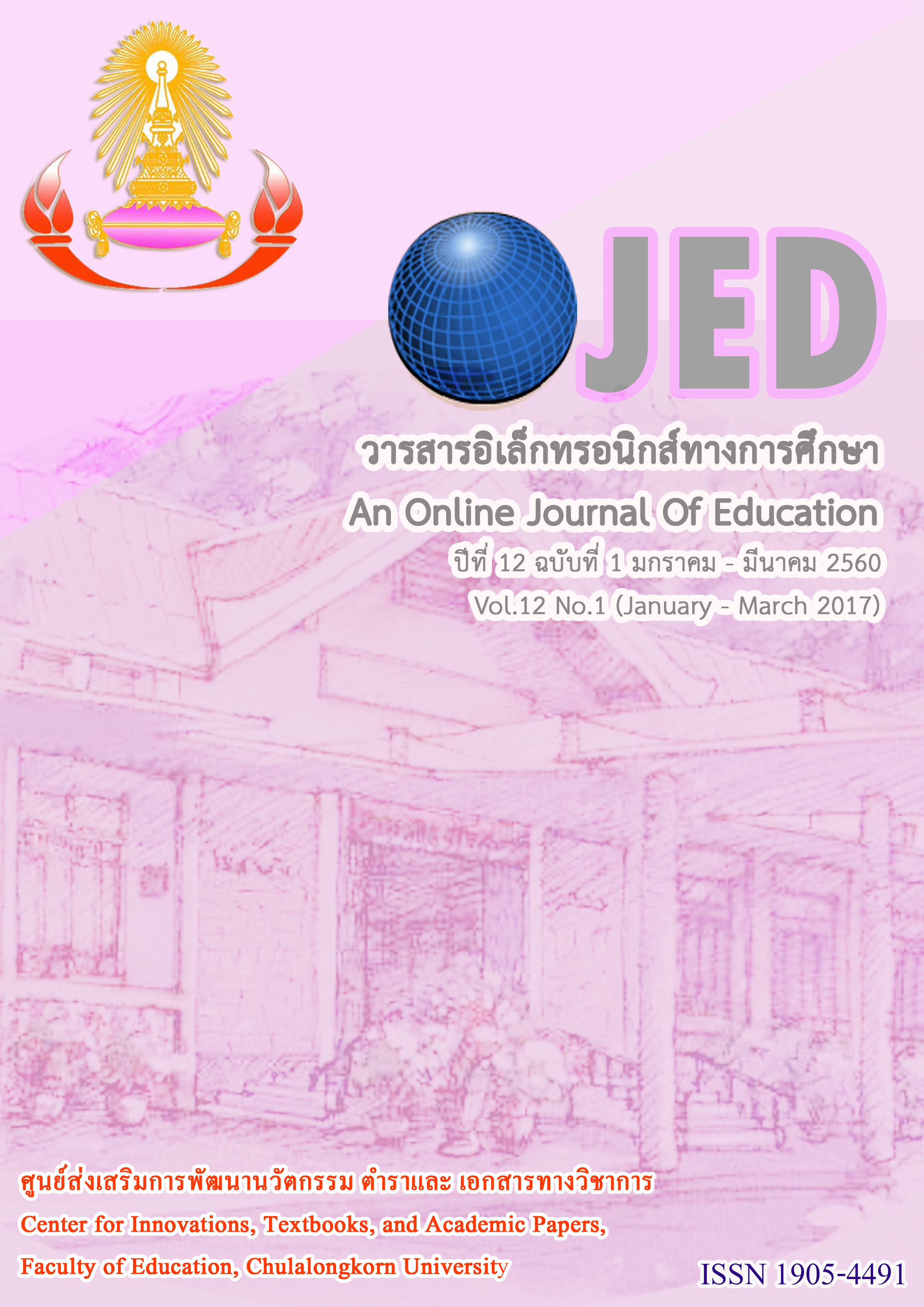ผลของแนวทางการแก้ปัญหาเชิงมโนทัศน์ที่มีต่อความสามารถในการแก้ปัญหา และมโนทัศน์ฟิสิกส์ของนักเรียนมัธยมศึกษาตอนปลาย
Keywords:
แนวทางการแก้ปัญหาเชิงมโนทัศน์, ความสามารถในการแก้ปัญหา, มโนทัศน์ฟิสิกส์, CONCEPTUAL PROBLEM SOLVING APPROACH, PROBLEM SOLVING ABILITY, PHYSICS CONCEPTSAbstract
การวิจัยนี้เป็นการวิจัยกึ่งทดลอง มีวัตถุประสงค์เพื่อ 1) ศึกษาความสามารถในการแก้ปัญหาฟิสิกส์ของนักเรียนกลุ่มที่เรียนด้วยแนวทางการแก้ปัญหาเชิงมโนทัศน์ 2) เปรียบเทียบความสามารถในการแก้ปัญหาฟิสิกส์ของนักเรียนกลุ่มที่เรียนด้วยแนวทางการแก้ปัญหาเชิงมโนทัศน์กับกลุ่มที่เรียนด้วยวิธีการสอนแบบทั่วไป 3) ศึกษามโนทัศน์ฟิสิกส์หลังเรียนของนักเรียนกลุ่มที่เรียนด้วยแนวทางการแก้ปัญหาเชิงมโนทัศน์และ 4) เปรียบเทียบมโนทัศน์ฟิสิกส์ของนักเรียนกลุ่มที่เรียนด้วยแนวทางการแก้ปัญหาเชิงมโนทัศน์กับกลุ่มที่เรียนด้วยวิธีการสอนแบบทั่วไป กลุ่มตัวอย่างคือ นักเรียนชั้นมัธยมศึกษาปีที่ 4 ที่กำลังศึกษาอยู่ในภาคเรียนที่ 1 ปีการศึกษา 2559 โรงเรียนมัธยมศึกษาขนาดใหญ่พิเศษ เขตพื้นที่การศึกษามัธยมศึกษาเขต 1 กรุงเทพมหานคร จำนวน 101 คน แบ่งเป็นกลุ่มทดลอง 49 คน และกลุ่มควบคุม 52 คน เครื่องมือที่ใช้ในการวิจัย คือ 1) แบบวัดความสามารถในการแก้ปัญหาฟิสิกส์ที่มีค่าความเที่ยง 0.877 และ 2) แบบวัดมโนทัศน์ฟิสิกส์ที่มีค่าความเที่ยง 0.779 วิเคราะห์ข้อมูลด้วยสถิติค่าเฉลี่ยเลขคณิต ค่าเฉลี่ยร้อยละเลขคณิต ส่วนเบี่ยงเบนมาตรฐานและสถิติทดสอบที ผลการวิจัยสรุปได้ดังนี้ 1) ร้อยละของคะแนนเฉลี่ยความสามารถในการแก้ปัญหาฟิสิกส์ของนักเรียนกลุ่มทดลองมีค่าเท่ากับ 62.44 ซึ่งสูงกว่าที่กำหนดไว้ร้อยละ 60 2) นักเรียนกลุ่มทดลองมีคะแนนเฉลี่ยความสามารถในการแก้ปัญหาฟิสิกส์หลังเรียนสูงกว่ากลุ่มควบคุมอย่างมีนัยสำคัญที่ระดับ .05 3) ร้อยละของคะแนนเฉลี่ยมโนทัศน์ฟิสิกส์ของนักเรียนกลุ่มทดลองมีค่าเท่ากับ 70.12 ซึ่งสูงกว่าที่กำหนดไว้ร้อยละ 70 4) นักเรียนกลุ่มทดลองมีคะแนนเฉลี่ยมโนทัศน์ฟิสิกส์หลังเรียนสูงกว่ากลุ่มควบคุมอย่างมีนัยสำคัญที่ระดับ .05
This study was a quasi-experimental research aimed to 1) study ghd ability in problem solving of an experimental group that learned through instruction using a conceptual problem solving approach, 2) compare the problem solving ability of students between groups learning by using the conceptual problem solving approach and conventional instruction, 3) study the physics concepts of the experimental group after learning physics by using the conceptual problem solving approach instruction and 4) compare the physics concepts between groups learning by using the conceptual problem solving approach and those learning with conventional instruction. The samples were two classes of Mathayom Suksa four of a large-sized school under the Office of the Basic Education Commission of Thailand, Bangkok, in the first semester of academic year 2016. One class of 49 students was chosen as the experimental group and another class of 52 students was chosen as the control group. The research instruments were 1) a problem solving ability test with a reliability of 0.877, and 2) a physics concepts test with a reliability of 0.779. The collected data were analyzed by using arithmetic mean, mean of percentage, standard deviation and t-test. The research findings were summarized as follows: 1) the percentage of problem solving ability mean score of the experimental group was 62.44 higher than the criterion score set at 60 percent; 2) the experimental group’s mean scores in the posttest in problem solving ability were higher than the control group’s posttest scores at a .05 level of significance.; 3) the percentage of physics concepts mean score of the experimental group was 70.12 higher than the criterion score set at 70 percent; and 4) Tte experimental group’s mean scores in the posttest in physics concepts were higher than the control group’s posttest scores at a .05 level of significance.




